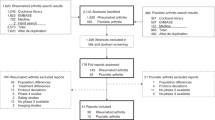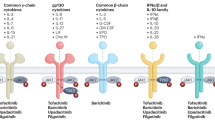Key Points
-
The market for biologic therapies for rheumatic diseases is large, with sales totalling over $200 billion to date; however, their popularity is not justified by the available evidence
-
The clinical trial evidence relating to biologic agents used to treat rheumatic diseases has several shortcomings that prevent optimal implementation of these agents in clinical practice and complicate regulatory decision making
-
A paucity of head-to-head comparisons, limited follow-up times, variations in outcome definitions and nomenclature, and non-publication of trials and outcomes limit our understanding of biologic agents
-
Most trials are pharmaceutical-industry-sponsored, and have short follow-up periods and small sample sizes, which restrict our interpretation of the clinical relevance of the findings with regard to long-term disease outcomes
-
The lack of long-term randomized trials of biologic agents has limited our understanding of the association of these drugs with adverse events, particularly the risk of malignancies and serious infections
-
Larger study populations, longer follow-up times, better reporting and head-to-head comparisons of biologic agents would increase knowledge of the benefits and risks associated with the different treatments available
Abstract
Anti-TNF agents and other biologic therapies are widely prescribed for a variety of indications, with total sales that exceed $200 billion to date. In rheumatic diseases, biologic agents have now been studied in more than 200 randomized clinical trials and over 100 subsequent meta-analyses; however, the information obtained does not always meet the needs of patients and clinicians. In this Review, we discuss the current issues concerning the evidence derived from such studies: potential biases favouring positive results; a paucity of head-to-head comparisons between biologically active agents; overwhelming involvement of manufacturer sponsors in trials and in the synthesis of the evidence; the preference for trials with limited follow-up; and the potential for spurious findings on adverse events, leading to endless debates about malignancy risk. We debate the responsibilities of regulatory authorities, the pharmaceutical industry and academia in attempting to solve these shortcomings and challenges. We propose that improvements in the evidence regarding biologic treatments that are continually being added to the therapeutic armamentarium for rheumatic diseases might require revisiting the design and conduct of studies. For example, trials with long-term follow-up that are independent of the pharmaceutical industry, head-to-head comparisons of therapeutic agents and the use of rigorous clinical outcomes should be considered, and public availability of raw data endorsed.
This is a preview of subscription content, access via your institution
Access options
Subscribe to this journal
Receive 12 print issues and online access
$209.00 per year
only $17.42 per issue
Buy this article
- Purchase on Springer Link
- Instant access to full article PDF
Prices may be subject to local taxes which are calculated during checkout


Similar content being viewed by others
References
Helmick, C. G. et al. Estimates of the prevalence of arthritis and other rheumatic conditions in the United States: Part 1. Arthritis Rheum. 58, 15–25 (2008).
Lawrence, R. C. et al. Estimates of the prevalence of arthritis and other rheumatic conditions in the United States: Part 2. Arthritis Rheum. 58, 26–35 (2008).
Drugs information online. U. S. Pharmaceutical Sales—2012. Top 100 Drugs for 2012 by Sales [online], (2013).
Khan, N. A., Lombeida, J. I., Singh, M., Spencer, H. J. & Torralba, K. D. Association of industry funding with the outcome and quality of randomized controlled trials of drug therapy for rheumatoid arthritis. Arthritis Rheum. 64, 2059–2067 (2012).
Bourgeois, F. T., Murthy, S. & Mandl, K. D. Outcome reporting among drug trials registered in ClinicalTrials.gov. Ann. Intern. Med. 153, 158–166 (2010).
Dwan, K. et al. Systematic review of the empirical evidence of study publication bias and outcome reporting bias. PLoS ONE 3, e3081 (2008).
Gøtzche, P. C. Reference bias in reports of drug trials. Br. Med. J. (Clin. Res. Ed.) 295, 654–656 (1987).
Gøtzche, P. C. Multiple publication of reports of drug trials. Eur. J. Clin. Pharmacol. 36, 429–432 (1989).
Thorlund, K., Druyts, E., Aviña-Zubieta, J. A. & Mills, E. J. Anti-tumor necrosis factor (TNF) drugs for the treatment of psoriatic arthritis: an indirect comparison meta-analysis. Biologics 6, 417–427 (2012).
Chan, A. W. & Altman, D. G. Identifying outcome reporting bias in randomised trials on PubMed: review of publications and survey of authors. BMJ 330, 753 (2005).
Chan, A. W., Krieza-Jerić, K., Schmid, I. & Altman, D. G. Outcome reporting bias in randomized trials funded by the Canadian Institutes of Health Research. CMAJ 171, 735–740 (2004).
Chan, A. W., Hróbjartsson, A., Haahr, M. T., Gøtzche, P. C. & Altman, D. G. Empirical evidence for selective reporting of outcomes in randomized trials: comparison of protocols to published article. JAMA 291, 2457–2465 (2004).
Thorlund, K., Druyts, E., Aviña-Zubieta, J. A., Wu, P. & Mills, E. J. Why the findings of published multiple treatment comparison meta-analyses of biologic treatments for rheumatoid arthritis are different: an overview of recurrent methodological shortcomings. Ann. Rheum. Dis. http://dx.doi.org/10.1136/annrheumdis-2012-201574.
Gøtzche, P. C. Reporting of outcomes in arthritis trials measured on ordinal and interval scales is inadequate in relation to meta-analysis. Ann. Rheum. Dis. 60, 349–352 (2001).
Gøtzche, P. C. Sensitivity of effect variables in rheumatoid arthritis: a meta-analysis of 130 placebo controlled NSAID trials. J. Clin. Epidemiol. 42, 1313–1318 (1990).
Gøtzche, P. C. Methodology and overt and hidden bias in reports of 196 double-blind trials of nonsteroidal antiinflammatory drugs in rheumatoid arthritis. Control. Clin. Trials 10, 31–56 (1989).
Simsek, I. & Yazici, Y. Incomplete reporting of recruitment information in clinical trials of biologic agents for the treatment of rheumatoid arthritis: a review. Arthritis Care Res. (Hoboken) 64, 1611–1616 (2012).
Sokka, T. & Pincus, T. Eligibility of patients in routine care for major clinical trials of anti-tumor necrosis factor α agents in rheumatoid arthritis. Arthritis Rheum. 28, 313–318 (2003).
Guyot, P. et al. Indirect treatment comparison of abatacept with methotrexate versus other biologic agents for active rheumatoid arthritis despite methotrexate therapy in the United Kingdom. J. Rheumatol. 39, 1198–1206 (2012).
Panagiotou, O. A., Contopoulos-Ioannidis, D. G. & Ioannidis, J. P. Comparative effect sizes in randomised trials from less developed and more developed countries: meta-epidemiological assessment. BMJ 346, F707 (2013).
Putrik, P. et al. Inequities in access to biologic and synthetic DMARDs across 46 European countries. Ann. Rheum. Dis. http://dx.doi.org/10.1136/annrheumdis-2012-202603.
Estellat, C. & Ravaud, P. Lack of head-to-head trials and fair control arms randomized controlled trials of biologic treatment for rheumatoid arthritis. Arch. Intern. Med. 172, 237–244 (2012).
Ioannidis, J. P. & Karassa, F. B. The need to consider the wider agenda in systematic reviews and meta-analyses: breadth, timing, and depth of the evidence. BMJ 341, c4875 (2010).
Lexchin, J., Bero, L. A., Djulbegovic, B. & Clark, O. Pharmaceutical industry sponsorship and research outcome and quality: systematic review. BMJ 326, 1167–1170 (2003).
Lathyris, D. N., Patsopoulos, N., Salanti, G. & Ioannidis, J. P. Industry sponsorship and selection of comparators in randomized clinical trials. Eur. J. Clin. Invest. 40, 172–182 (2010).
Paul, J. R. & Ranganathan, P. Clinical trials in rheumatoid arthritis: a status report from the ClinicalTrials.gov website. Rheumatol. Int. 32, 1831–1835 (2012).
Sanderson, T., Morris, M., Calnan, M., Richards, P. & Hewlett, S. What outcomes from pharmacologic treatments are important to people with rheumatoid arthritis? Creating the basis of a patient core set. Arthritis Care Res. (Hoboken) 62, 640–646 (2010).
Wells, G., Li, T., Maxwell, L., Maclean, R. & Tugwell, P. Responsiveness of patient reported outcomes including fatigue, sleep quality, activity limitation, and quality of life following treatment with abatacept for rheumatoid arthritis. Ann. Rheum. Dis. 67, 260–265 (2008).
Roundtree, A. K. et al. Poor reporting of search strategy and conflict of interest in over 250 narrative and systematic reviews of two biologic agents in arthritis: a systematic review. J. Clin. Epidemiol. 62, 128–137 (2009).
Jørgensen, A. W., Hilden, J. & Gøtzche, P. C. Cochrane reviews compared with industry supported meta-analyses and other meta-analyses of the same drugs: systematic review. BMJ 333, 782 (2006).
Aletaha, D. et al. 2010 Rheumatoid arthritis classification criteria: an American College of Rheumatology/European League Against Rheumatism collaborative initiative. Arthritis Rheum. 62, 2569–2581 (2010).
Aletaha, D. et al. Reporting disease activity in clinical trials of patients with rheumatoid arthritis: EULAR/ACR collaborative recommendations. Arthritis Rheum. 59, 1371–1377 (2008).
Funovits, J. et al. The 2010 American College of Rheumatology/European League Against Rheumatism classification criteria for rheumatoid arthritis: methodological report phase I. Ann. Rheum. Dis. 69, 1589–1595 (2010).
Lopez-Olivo M. A. et al. Risk of malignancies in patients with rheumatoid arthritis treated with biologic therapy: a meta-analysis. JAMA 308, 898–908 (2012).
Thompson, A. E., Rieder, S. W. & Pope, J. E. Tumor necrosis factor therapy and the risk of serious infection and malignancy in patients with early rheumatoid arthritis: a meta-analysis of randomized controlled trials. Arthritis Rheum. 63, 1479–1485 (2011).
Leombruno, J. P., Einarson, T. R. & Keystone, E. C. The safety of anti-tumour necrosis factor treatments in rheumatoid arthritis: meta and exposure-adjusted pooled analyses of serious adverse events. Ann. Rheum. Dis. 68, 1136–1145 (2009).
Bongartz, T. et al. Anti-TNF antibody therapy in rheumatoid arthritis and the risk of serious infections and malignancies: systematic review and meta-analysis of rare harmful effects in randomized controlled trials. JAMA 295, 2275–2285 (2006).
Singh, J. A. et al. Adverse effects of biologics: a network meta-analysis and Cochrane overview. Cochrane Database Syst. Rev. Issue 2. Art. No.: CD008794 (2011).
Yazici, Y. & Yazici, H. A survey of inclusion of the time element when reporting adverse effects in randomised controlled trials of cyclo-oxygenase-2 and tumour necrosis factor α inhibitors. Ann. Rheum. Dis. 66, 124–127 (2007).
Smolen, J. S. et al. Recommendations for an update of 2003 European regulatory requirements for registration of drugs to be used in the treatment of RA. Curr. Med. Res. Opin. 27, 315–325 (2011).
Ioannidis, J. P. Mega-trials for blockbusters. JAMA 309, 239–240 (2013).
Wolfe, F. & Michaud, K. Towards an epidemiology of rheumatoid arthritis outcome with respect to treatment: randomized controlled trials overestimate treatment response and effectiveness. Rheumatology (Oxford) 44 (Suppl. 4), iv18–iv22 (2006).
Yazici, H. Beware of registries for their biases. Bull. NYU Hosp. Jt Dis. 70, 95–98 (2012).
The AllTrials Petition. All Trials Registered | All Results Reported [online], (2013).
Doshi, P. & Jefferson, T. The first 2 years of the European Medicines Agency's policy on access to documents: secret no longer. JAMA Intern. Med. 173, 380–382 (2013).
Doshi, P. & Jefferson, T. Clinical study reports of randomised controlled trials: an exploratory review of previously confidential industry reports. BMJ Open 3, e002496 (2013).
O'Dell, J. R. et al. Therapies for active rheumatoid arthritis after methotrexate failure. N. Engl. J. Med. 369, 307–318 (2013).
Author information
Authors and Affiliations
Contributions
All authors made substantial contributions to all stages of the preparation of this manuscript.
Corresponding author
Ethics declarations
Competing interests
K. Thorlund and E. J. Mills declare that they have acted as consultants for GSK, Merck, Novartis, Nycomed and Pfizer. J. P. A. Ioannidis, F. B. Karassa and E. Druyts declare no competing interests.
Supplementary information
Supplementary Table 1
Eligible randomized controlled trials of anti-TNF agents in immune-mediated diseases (DOC 427 kb)
Rights and permissions
About this article
Cite this article
Ioannidis, J., Karassa, F., Druyts, E. et al. Biologic agents in rheumatology: unmet issues after 200 trials and $200 billion sales. Nat Rev Rheumatol 9, 665–673 (2013). https://doi.org/10.1038/nrrheum.2013.134
Published:
Issue Date:
DOI: https://doi.org/10.1038/nrrheum.2013.134
This article is cited by
-
Better prioritization to increase research value and decrease waste
BMC Medicine (2015)
-
A transparent future for clinical trial reporting
Nature Reviews Rheumatology (2015)
-
Comparative Effectiveness of Topical Drugs in Dermatologic Priority Diseases: Geometry of Randomized Trial Networks
Journal of Investigative Dermatology (2015)
-
Evidence-based de-implementation for contradicted, unproven, and aspiring healthcare practices
Implementation Science (2014)
-
Network meta-analysis for comparing treatment effects of multiple interventions: an introduction
Rheumatology International (2014)



